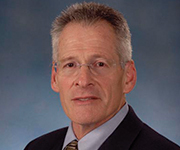Alan Faden, MD

Alan Faden, MD
Professor and Center Director, Department of Anesthesiology
SCHOOL OF MEDICINE
-
Research interests
TBI
SCI
Mechanisms of chronic pain and its modulation after spinal cord injury
-
Research approaches
modeling
behavior
molecular/cellular biology
pharmacology
ORCID ID: orcid.org/0000-0003-0128-2348
Lab or individual page: http://www.medschool.umaryland.edu/fadenlab/
Publications
-
Wu J, Renn CL, FADEN AI, Dorsey SG. TrkB.T1 contributes to neuropathic pain following spinal cord injury through regulation of cell cycle pathways. Journal of Neuroscience, 24 July 2013, 33(30):12447-12463; doi:10.1523/JNEUROSCI.0846-13.2013
-
Wu J, Zhao Z, Sabirzhanov B, Stoica BA, Kumar A, Luo T, Skovira J, FADEN AI. Spinal cord injury causes brain inflammation associated with cognitive and affective changes: role of cell cycle pathways. J Neurosci, 34(33):10989-11006, 2014.
-
Lipinski, M. M., Liu, S., Sarkar, C., Dinizo, M., FADEN AI, Koh, E., & Wu, J. (2014). Disrupted autophagy after spinal cord injury is associated with ER stress and neuronal cell death. Cell Death and Disease 2014 Nov 11:0. [Epub ahead of print].
-
Wu J, Zhao Z, Zhu X, Renn CL, Dorsey SG, FADEN AI. Cell cycle inhibition limits development and maintenance of neuropathic pain following spinal cord injury. Pain. 2016 Feb;157(2):488-503. doi: 10.1097/j.pain.0000000000000393.PMID: 26797506.
-
Matyas JJ, O'Driscoll CM, Yu L, Coll-Miro M, Daugherty S, Renn CL, FADEN AI, DorseySG, Wu J.Truncated TrkB.T1-mediated astrocyte dysfunction contributes to impaired motor function and neuropathic pain after spinal cord injury. J Neurosci. 2017 Mar 7. pii: 3353-16.[Epub ahead of print] PMID: 28270575.



